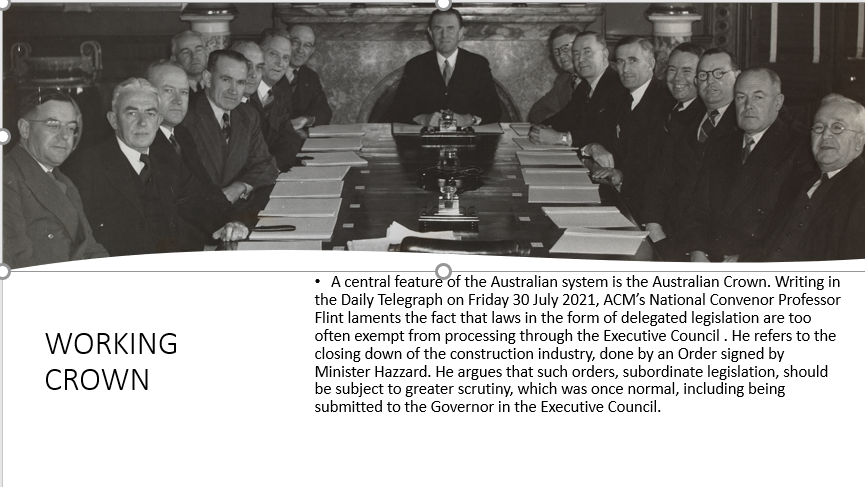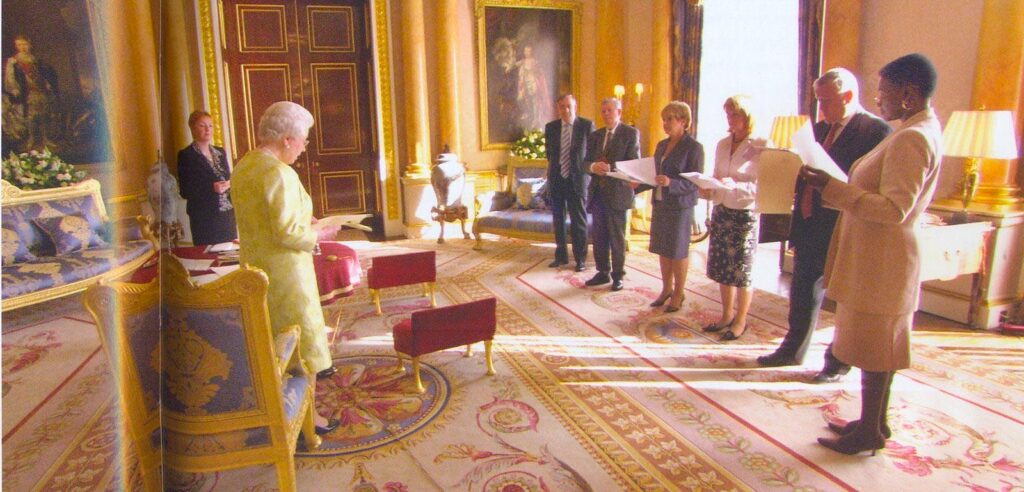Australians for Constitutional Monarchy fought the 1999 referendum for several reasons. But what was common to us and our allies was that what was being proposed was not a constitutional republic. Many of us believe, including John Howard and Tony Abbott, that we are already a republic, a crowned republic. What was on offer in 1999 was a politicians’ republic, in which the normal checks and balances would be significantly diminished. It would have been the only republic in history in which the president would be dismissible by the PM without notice, without grounds, and without any right of appeal.

ACM is, as Tony Abbott has declared, ” one of the constitution’s fiercest defenders.” With that in mind, and without taking any position on the various pandemic measures, ACM is now calling for a re-examination of the processes of constitutional governance during emergencies such as the COVI-19 virus.
Indeed before there is any consideration of moving from our crowned republic to a politicians republic, recourse to the regulation making power during COVID should first be urgently considered in the constitutional context. One example of a questionable exercise of the power with enormous consequences on the rights of Australians was the closure of the building industry for two weeks in New South Wales at a cost reported to be of $1.4 Billion. This exercise was announced by the Premier and effected by the Health Minister without, it subsequently transpired, supporting advice from the Chief Health Officer Dr Kerry Chant. Any other advice the Minister had was not made public.
This is only one example of questionable exercises of power by both state and federal governments. This surely indicates, at least , in the opinion of this author, an urgent need to invite the people to constitutionalise the checks and balances that should apply to the making of regulations ( or “delegated legislation” ) under Acts of Parliament.
. But the checks and balances which once applied in Australia during colonial times and as a dominion have been whittled away. Such regulations would have once been submitted to the governor-general or governor in the executive council.

Too often, legislation delegates the power to make regulations by a minister acting alone or even ,in some states, by a bureaucrat.
Traditionally these were a matter for determination in the Executive Council. and would also be subject to disallowance in either House. ( More reason then, to re-establish the Queensland Legislative Council abolished by the politicians over a century ago contrary to the express wishes of Queenslanders.)
According to the Senate Standing Committee for the Scrutiny of Delegated Legislation, nearly 20 percent of all delegated legislation made in response to the pandemic between January and July 2020 was exempt from disallowance. This included all 27 legislative instruments made under the Biosecurity Act, and six Advance to the Finance Minister determinations, which allocated an additional $2.1 billion of public funds to aspects of the government’s response to COVID-19.
Some legal authorities advised the Committee that such regulation-making where Parliament abandons any scrutiny could well be unconstitutional.
None passed through the Executive Council but were made by the minister who recommended them. This too could be found to be unconstitutional in breach of the provisions concerning the executive power of the Commonwealth .
As regulations have the force of law, ACM believes they should be subject, as far as possible, to a similar formality, rigour and openness as governs the making of the statute under which they are made. The openness of the process would be assisted significantly if the regulation were supported by an Explanatory Memorandum similar to that which accompanies a bill on its introduction.
The role of the Governor-General (and in the States, the governor) should be as now, acting on advice but ensuring the proper process is observed, being satisfied he or she has the power to act as advised and that if there are any conditions on the exercise of that power, that these had been fulfilled. In addition to the role of the Executive Council, and consistent with the way the authorizing statute was passed, the power of the House to disallow the regulation should be restored.
The Senate Standing Committee recommended, without dissent, a return to Parliamentary supervision of the power to make regulations. ACM believes this should be associated with a return to the traditional role of the Executive Council in the making of regulations. While the United States was in many ways a model for the Australian Commonwealth, we have not followed her requirements of transparency, and public participation in making regulations, safeguards which are admired by many scholars as consistent with the fundamentals of deliberative democracy.
So why should not the people of Australia be allowed to decide whether the traditional checks and balances on the politicians be made binding on the politicians well before they are asked again whether they want to exchange what they have for some politicians republic?
[ David Flint 11 July 2022 . This subject was the principal theme of ACM’s National Conference, the 22nd since the referendum, held on 6 December 2021 and of an opinion by former judge the Hon. Ken Handley QC ]
